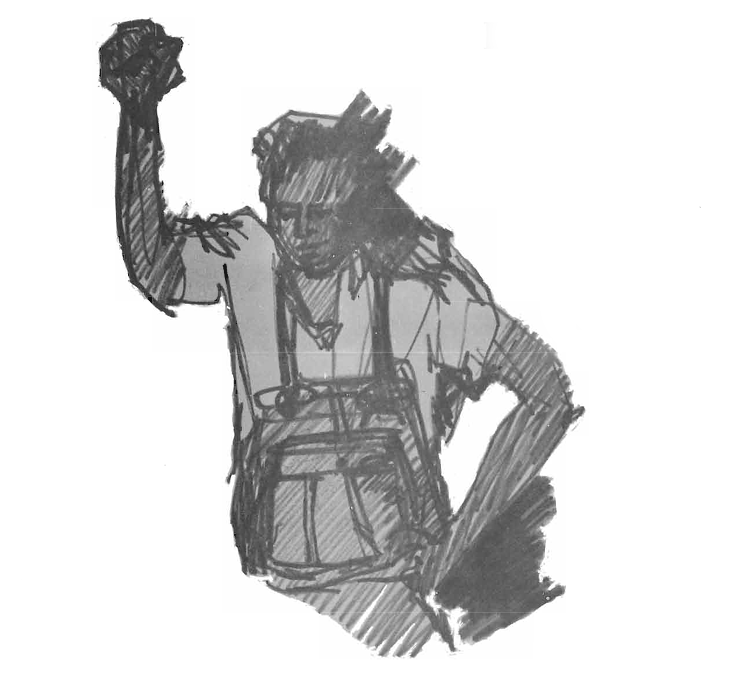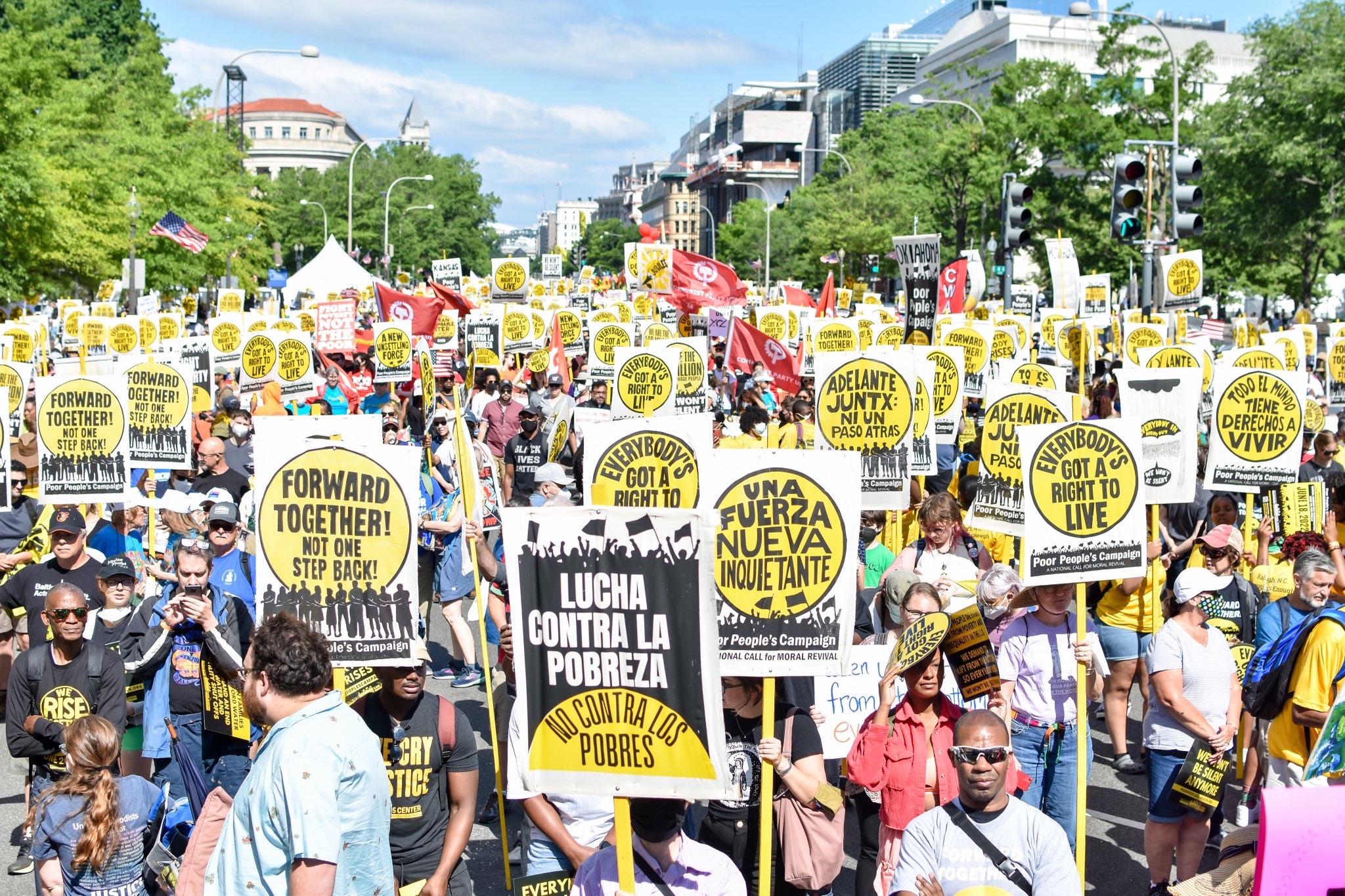by Anne Braden
This article is included in the volume Anne Braden Speaks: Selected Writings and Speeches, 1960-2006, edited by Ben Wilkins (Monthly Review Press, 2022). It was originally part of publication The New South Student, December 1966, Southern Student Organizing Committee (SSOC), Nashville, TN. Available online at freedomarchives.org.
—
One of the very good effects that has come with the call for Black Power from the freedom movement is that today more people are recognizing the necessity to organize in the white community.
Some of us have been saying for a long time that this is a necessity — and to its everlasting credit, SSOC people were among those who saw this before it be came a popular concept. Now there is much more general acceptance of the idea.
We have SNCC to thank for this, of course. Stokely Carmichael has been quoted as saying SNCC is not interested in saving this country, it just wants to save black people. But it may well be that if SNCC does the correct things to save black people, it will save the rest of us as a by-product.
A Call For Change
Certainly when SNCC began saying it was useless to talk about coalitions because there were no meaningful white groups to coalesce with, many white people began to see they had not been doing their homework. When SNCC told its white organizers they could not work effectively in black communities, it may have been thinking mainly of what was best for those communities. But in the process, it forced a lot of people to examine themselves and their role in the movement; at least some of them are turning to the work they should have done long ago, organizing the white community for social change.
I think this trend is moving so firmly now that we need not belabor the theory of it. We have now reached the point where we need to deal in the practicalities of how we will go about this thing of organizing white people.
In this, I am referring mainly to organizing poor white people. Many of us have long been trying to organize middle class white people to support the freedom movement — and not totally without some breakthroughs. But we always knew that if we really wanted to create a new South, we who believed in black-white unity must also organize among the poor and disinherited whites of the South. Now for the first time in 30 years, it appears that the circumstances are ripe for doing so.
The Uncharted Road
For most of us, this is an uncharted road. This applies to the SSOC generation certainly, and also to my generation which came along in the late ’40’s, too late to have experience in the movements of tenant farmers and industrial workers that did reach poor white southerners in the 1930’s. This means we have to learn partly by trial and experiment, and we have to expect to make some mistakes. The main point now, it seems to me, is to get this effort out of the parlor-talk stage as quickly as possible and begin to create some experiences we can learn from. In other words, let’s do something — even if it turns out to be the wrong thing.
As a matter of fact, we are beginning to have a few scattered current experiences from which we can learn. SCEF had one such organizing project in East Tennessee which failed, at least for the time being, and we learned a number of things in the process. We now have pilot projects aimed at reaching poor white people in West Virginia, Kentucky, and Louisiana; we are also lending full-time staff to a similar project initiated by people in Nashville. SSOC is making some similar efforts, as are a few other scattered groups.
It is on the basis of these experiences — admittedly limited so far — that I want to point out what I think are some of the dangers we face, and some of the necessities.
Self-Awareness
First and foremost, as we move into organizing work in white communities, I think we need to· remember who we are and what we are about. Virtually all of us came out of the Negro freedom movement — that is, our lives have been shaped to a large degree by this movement. We are what we are today because we became convinced that we can never have a good society in this country (or in the world) unless white people overcome their inherent racism, and build a unity of black and white to work toward mutually important goals. In other words, our work in the white community is in large part a search for a situation in which there can be a meaningful black-white alliance.
Some might say that if this is our viewpoint, we just want to “use” these white people — that their needs are not important in themselves. I don’t think this is the case at all. Certainly the inherent needs of poor white people are reason enough to organize — they, like poor black people, are ill-fed, ill-housed and lacking in opportunities for education, medical care, political expression, and dignity. But I think what we are recognizing is that these wbite people will never be able to solve these problems unless they find ways to unite with the black movement seeking the same things. All of southern history proves this to be the case.
Unless we are continuously aware of this basic fact and necessity– I think we can make some very serious mistakes. In many areas, white people live in their own ghettos, just as Negroes do. I can see the possibility that our organizers could become so engrossed in the problems of these neighborhoods — in the immediate day-to-day issues facing the people they are working with — that they could completely forget to raise the question of the need to seek alliances in the black communities. I can see how one might work a year or so, begin to see some results in terms of community organization among whites and come to feel he has been rather successful. He could do this and yet never have raised the matter of white racism which the white people have to overcome before they can create the social changes that will really help them.
The ultimate and worst result of such organizing, although it would never be our intention, could be the formation of new white racist groups.
Toward Coalition
It was my concern over this danger that led me to write a paper for a SSOC conference last spring suggesting that any organizing in the white community should be an effort to organize white and black together. I also suggested that, where possible, work in white communities should combine the efforts of black and white organizers.
I realize now that this may not always be possible. This is not, I am convinced, because it wouldn’t work in the white communities. And right here, I’d like to correct the false rumors that are circulating that the project in East Tennessee failed because it was an effort to organize black and white together. The failure of that project had absolutely nothing to do with the black-white issue. It was for other reasons that may be worth discussing sometime, but which are not pertinent at all to this particular point.
The reason a joint black-white effort may not always be possible is that more and more there is the trend for black people to want to organize their own groups and alone. Furthermore, we have found in regard to SCEF projects, that black people who want to try to work in and with white communities are few and far between.
So I am not suggesting any rigid approach. I hope it is obvious that I am not suggesting anything so mechanical as organizers ringing doorbells in white communities and opening the conversation by saying, “I’m here to talk about white supremacy and Negro-white unity and what you can do about it.” This is stupidity. Any organizer worth his salt listens a long time before he talks much, and he learns to adapt his approaches to the people he is working with and to their life situations.
Combatting Racism
What I am saying is that our organizers (and here I mean movement people, not just SCEF) need to have constantly on their minds this necessity for getting at the question of racism; they need to be looking for the opportunities to make it real to the people they are working with. We all know that white supremacist attitudes change fastest not by 1ogical argument, but when people have new experiences. We need to be on the lookout all the time for ways in which we can create those experiences for people. We need to look for the situations in which white people need the strength that can come from alliance with black people on issues of common concern. And we need to encourage them to seek these alliances.
White Responsibility
Let us face the fact that if such alliances are built in the coming period whites are going to have to seek them. Stokely Carmichael has said that integration is irrelevant when initiated by black people, and he is probably right. In any event, this attitude is spreading among black people, and in many places they are not going to take the first step toward even temporary alliances. It is time for some initiative on this to come from the white community–and a big part of our job is to help others see the necessity for it.
Another thing those of us working in white communities are going to have to realize is that in keeping this question uppermost in our minds and efforts, we will be pretty much on our own. SNCC is not likely to be coming around reminding us of it – nor are militant black people anywhere. White people have always needed black people to nudge their consciences. From now on, we are going to have to be our own consciences, I think. This is because most militant black people won’t be taking our efforts to organize poor white people very seriously. It’s not that they are opposed to it; SNCC has said they want it to happen, and I think they do. But most of them don’t think it is possible. So they have more important things to do. And the job of keeping the white organizing efforts on the track and geared to the goals we started with will be up to us.
The Pitfalls
There are two pitfalls I think we need to avoid.
One is the tendency to think there is some easy and painless way to combat racism in the white southerner — or in the white American anywhere. This illusion, I think, is what leads people to decide not to mention the question, to hope that unity will come someday if we don’t talk about it very much. It’s sort of the soft-sell approach–boiling the frog without his realizing he’s being boiled.
I’ve been a white southerner all my life. I’ve seen a lot of racism, and I’ve seen a considerable number of people change their views. Nothing in my experience or my observation has ever led me to doubt a proposition that I consider key: that there is no easy way to get over this hump, that it must be tackled head on, that people must be confronted with the consequences of their racist views and put into a situation where they have to face the truth. Truth is painful, and people usually have to turn themselves inside out to accept it. Once they have done that, things happen. I think it’s worth the pain — and the effort.
Again, I’m not saying you always do this in the first conversation with somebody; it may not be a verbal approach that will work at all — it may have to be a situation where a man who has always hated Negroes suddenly knows he needs black people. But in some form, it has to be a confrontation, and it has to be painful. There is no short cut.
The other pitfall that worries me may seem to contradict the first, but I don’t think it does. This is the danger of thinking most white southerners are hopeless on this question — that there is nothing that can be done about it so we should keep quiet on it if we possibly can. I’ve seen this attitude over and over in white organizers from the North — dating back to 20 years ago when I had some occasion to work with northern white union organizers who came South. Their present-day counterparts sometimes have the same timid approach — the feeling that race is unmentionable with the white southerner and you avoid the subject if you can.
Facts of Life
I think we who are white and southern can steer a course between these two pitfalls. We don’t expect it to be easy for people to change the patterns of a lifetime. But we have more faith that it can be done.
There’s not a one of us in this movement who has not changed drastically from what we were when we grew up. We changed because certain experiences came into our lives. We changed not because anyone tried to protect us from the issue — or because they let it alone and figured we’d find our own way gradually if not too much was said. Most often we changed because we were confronted with the issue dramatically and had to re-think our lives.
I think we need to stop feeling, even unconsciously, that we are something special — that we could change but others someway don’t quite have the intelligence or flexibility to do so.
I think we need an abiding faith that every white southerner is potentially in a state of flux — that he can go one way or the other — and that we have a responsibility to nudge history along just a bit by providing him with the opportunities to experience new things and think in new ways.
Keeping the Perspective
Unless this perspective is constantly in our minds, I have the fear that all our work in the white community — although it may address itself to some economic and political issues — will at best be the tinkling brass and the sounding cymbal. At worst, it could create some Frankenstein monsters that we will live to regret.
“Anybody, at any time, may equally find himself victim or executioner.” – Sartre


